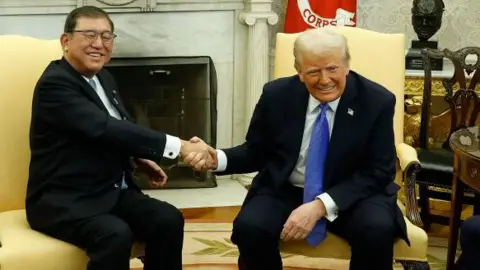Tokyo correspondent
If Japan needed reassurances it was indeed still the US’s top ally and friend in the increasingly unstable Asia-Pacific, it got that and then some.
But what was striking about the Trump-Ishiba meeting at the White House was what didn’t happen.
Unlike most of the Trump domestic and global dynamics so far, this was neither controversial nor confrontational.
“On television, he is very frightening,” Japanese Prime Minister Shigeru Ishiba told reporters after Friday’s meeting.
“But when I met him, he was very sincere, very powerful and strong willed,” he added.
There’s a lot that ties Washington and Tokyo. Japan has been the top foreign investor in the US for five consecutive years, creating thousands of jobs. And there are 54,000 US military personnel stationed in Japan.
But President Donald Trump has given his friends and foes a lot to worry about: from tariff wars against China, Canada and Mexico to his US “ownership” of Gaza proposal and his sanctions against the International Criminal Court.
“Trump has made some erratic decisions towards countries that believed themselves to be America’s friends,” said Jeffrey Hall, lecturer at Japan’s Kanda University of International Studies.
“There was a fear in Tokyo that the same might happen: that Trump might slap huge tariffs on Japan or start some dispute. But that didn’t happen,” he added.
Trump ‘study sessions’
While Trump didn’t rule out tariffs against Tokyo, it wasn’t the main feature of this meeting.
Ishiba went to Washington prepared. He’d studied. Literally. he held “study sessions” with staff and sought advice from his predecessor, Fumio Kishida.
He also had some help from the widow of the late former PM Shinzo Abe, who had a close relationship with Trump during his first presidency, forged on the golf course.
Ishiba’s homework paid off.
Apart from when Trump mistakenly referred to Nippon Steel as “Nissan”, there weren’t many eye-raising moment like the many other announcements by the US president.
In fact – as far as Japan is concerned – this meeting was reassuring.

 Getty Images
Getty ImagesBoth leaders seemed to have met eye-to-eye on their countries’ plans to boost trade and defence ushering in a “golden-era” of Japan-US relations.
Ishiba announced his country’s plans to increase investment in the US to $1tn (£806bn), as the two economic powers rebalance trade relations.
Ishiba said Japanese car makers would boost investment, while Tokyo would expand imports of US liquified natural gas (LNG).
This would have been music to Trump’s ears and a boost to his “drill, baby, drill” announcement from his inauguration speech.
The two men also managed to find common ground on the controversial issue of Nippon Steel.
Trump said Nippon would “invest heavily” in the Pennsylvania-based US Steel without taking a majority stake.
The Japanese firm’s attempted takeover of US Steel had been previously blocked by President Joe Biden on national security grounds.
Keeping talks simple
There were enough boxes ticked for Japan to breathe easy – but the main purpose of Ishiba’s visit was personal.
The Japanese PM has been in a fraught political position at home – with his minority government keeping a weak grip on power after it was humiliated in October’s general elections when they lost their ruling majority.
Ishiba was desperate for a win.
The man himself has not elicited much confidence in how he would fare opposite a notorious Trump.
“For weeks local media played up the idea that he would not succeed diplomatically – that he was clumsy, not a sociable person and that Trump would eat his lunch, if he made it to Washington,” said Mr Hall.
But Ishiba is walking away with what looks a lot like success.
The former Japanese defence minister is a veteran politician known for dense speeches in parliament. Observers have said such speeches manage to confuse some of his opponents and bore others.
But in a “Trump strategy meeting” with his staff, the biggest piece of advice he reportedly got was: “Conclusion first. Keep it simple.”
“Ishiba followed a play book to flatter Trump personally and offer him economic investments in the US instead of confronting him”, said Mr Hall.
Avoiding confrontation
There are several issues that Japan and the US could disagree on. Not least Trump’s proposal of a US takeover of the Gaza Strip, which sparked fierce criticism around the world.
Japan reiterated its long-standing position of supporting a two-state solution.
“We won’t change our stance,” said Foreign Minister Takeshi Iwaya last week.
Tokyo is also watching Trump’s trade war with China nervously.
But Hall said Japan would not be drawn into the US-China trade war if it could help it.
When it comes to China, Japan needs to strike a fine balance.
Beijing is Tokyo’s largest trading partner. China is one of the largest investment destinations for Japanese companies.
On the defence and diplomatic front both the US and Japan are challenged by China’s rising influence and assertiveness in the region and globally.
Not least with Chinese military’s now frequent and provocative moves in waters near Taiwan which Beijing sees as a renegade province.
In 2022, Japan, a pacifist nation, announced it would double its military spending by 2027, citing threats posed by China and North Korea, and saying it would acquire the ability to strike enemy bases.
The changes marked the most dramatic overhaul to Japan’s security strategy since it adopted a pacifist constitution after World War Two.
With North Korea continuing its nuclear program, South Korea in political meltdown, and the ongoing US-China rivalry, Japan has yet again presented itself as America’s least challenging and only unproblematic friend in the region.
“Japan will avoid any conformation with Trump when possible. It will most likely become a ‘yes’ friend,” said Hall.




















